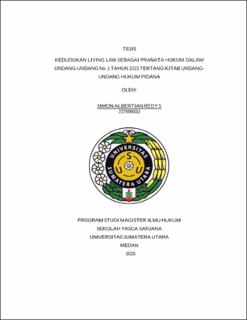| dc.description.abstract | Every nation has a foundation for punishing those who violate its norms, commonly codified in the Criminal Code, which governs criminal acts, investigation and prosecution processes, and stipulations for criminal offenses. As an archipelagic state, Indonesia embraces diverse customs and cultures, resulting in various customary laws. According to the Indonesian Constitution, customary law is recognized and respected as part of Indonesia's legal system. In 2023, Indonesia enacted a new Criminal Code reflecting its cultural and societal values, distinctfrom the colonial-era Criminal Code. This change raises issues regarding its implementation, particularly the integration of customary law into the prevailing positive legal framework, which may lead to conflicts between the two systems. This research focuses on these challenges.
The study adopts normative legal research methods with a statutory, conceptual, and comparative approach. The primary legal materials include the 1945 Constitution of the Republic of Indonesia, Law No. I of 2023 on the Criminal Code, and secondary legal materials •such as literature supporting the primary sources obtained through library research.
The findings reveal that customary law can be applied when elements or offenses in existingpositive law do not cover certain actions. Customary law serves to fill legal gaps in cases ofunregulated offenses. Moreover, during the investigation and prosecution stages, offenders may be subject to customary law before being subjected to applicable positive law. | en_US |


